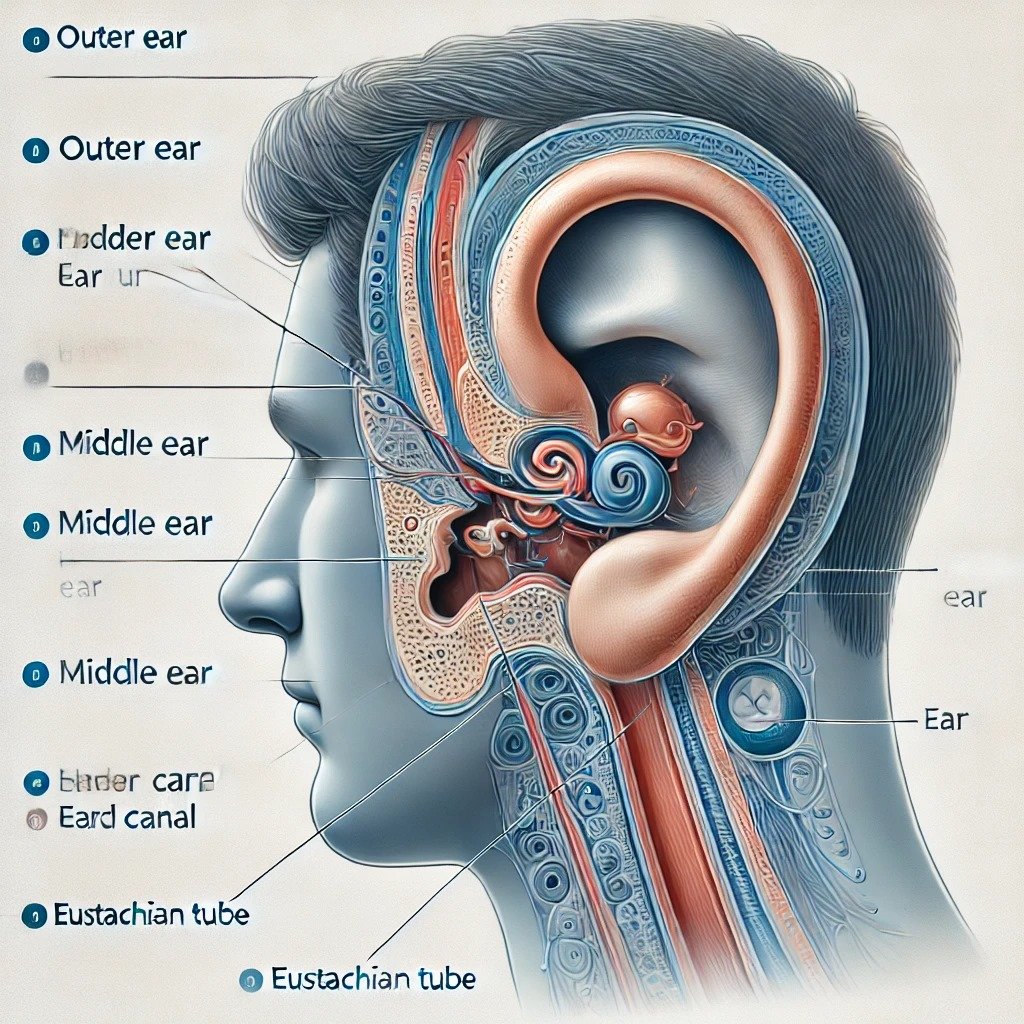Ear Pain, also known as otalgia, is a common issue that can affect people of all ages. It can range from a mild discomfort to severe, sharp pain. Ear pain often disrupts daily activities, sleep, and overall well-being. The causes of ear pain are varied, including infections, blockages, or injuries. This article explores the different causes, symptoms, and effective home remedies to alleviate ear pain.

Common Causes of Ear Pain
1. Middle Ear Infection (Otitis Media):
The most common cause of ear pain is a middle ear infection, especially in children. This infection occurs when fluid builds up behind the eardrum, causing inflammation and pressure. Middle ear infections often follow a cold or respiratory infection, which can spread to the ear through the eustachian tubes.
2. Outer Ear Infection (Otitis Externa):
Also known as swimmer’s ear, this infection affects the ear canal’s outer part. It is often caused by water that remains in the ear after swimming, creating a moist environment that fosters bacterial growth. Other causes include inserting objects like cotton swabs or fingernails into the ear, which can injure the ear canal’s delicate skin.
3. Earwax Blockage:
Earwax (cerumen) plays a protective role by trapping dust and debris and preventing them from entering the deeper parts of the ear. However, when earwax accumulates excessively, it can harden and cause pain, itching, and even temporary hearing loss.
4. Sinus Infections:
Sinus infections can lead to ear pain by creating pressure in the nasal passages, which can radiate to the ears. This type of pain is often accompanied by other symptoms like a runny nose, headache, and facial pain.
5. Foreign Objects in the Ear:
Especially common in children, foreign objects like small toys, beads, or food can become lodged in the ear. This can cause significant discomfort and pain, and may also lead to infection if not removed promptly.
6. Eustachian Tube Dysfunction:
The eustachian tubes connect the middle ear to the back of the throat and help regulate ear pressure. When these tubes become blocked or do not function properly, it can cause ear pain, a feeling of fullness, and hearing difficulties.
7. Temporomandibular Joint (TMJ) Disorders:
The TMJ connects the jawbone to the skull and is located near the ear. Problems with this joint, such as arthritis, misalignment, or grinding of teeth, can result in referred pain in the ear.
Symptoms Associated with Ear Pain
Ear pain is usually accompanied by various other symptoms that help in diagnosing the underlying cause:
– Hearing Loss: Partial or complete loss of hearing can occur, depending on the cause.
– Discharge from the Ear: A clear, yellow, or bloody fluid may drain from the ear, especially in the case of an infection or injury.
– Tinnitus: Ringing, buzzing, or humming noises in the ear.
– Fever: Common in cases of ear infections.
– Vertigo: A sensation of spinning or dizziness, which may indicate an inner ear issue.
– Swelling or Redness: Particularly noticeable in outer ear infections.
Effective Home Remedies for Ear Pain
While it’s always advisable to consult a healthcare professional for ear pain, especially if symptoms persist or worsen, several home remedies can provide relief in mild cases:
1. Warm Compress:
Applying a warm compress to the affected ear can help reduce pain and inflammation. The warmth promotes circulation and eases discomfort caused by infections or fluid buildup.
2. Olive Oil:
Olive oil can soften earwax and relieve pain. Warm a small amount of olive oil and place a few drops in the affected ear using a dropper. However, this remedy should not be used if there is any discharge or if a perforated eardrum is suspected.
3. Garlic Oil Drops:
Garlic has natural antimicrobial properties. Garlic oil drops, made by infusing garlic cloves in warm olive oil, can be used to soothe ear pain and fight infection. Ensure the oil is only lukewarm and not hot before application.
4. Hydrogen Peroxide:
A few drops of hydrogen peroxide in the ear can help to clean out wax and debris. After a few minutes, tilt the head to let the fluid drain out, then rinse the ear with clean water.
5. Chewing Gum:
For ear pain caused by pressure changes, such as during air travel, chewing gum or yawning can help open the eustachian tubes and equalize pressure.
6. Ginger Juice:
Ginger’s anti-inflammatory properties can help reduce pain. Apply freshly extracted ginger juice around the outer ear canal, but avoid putting it directly into the ear.
7. Stay Hydrated:
Drinking plenty of fluids, especially warm teas and soups, can help thin mucus and relieve pressure in the ears caused by sinus infections.
READ MORE- EAR PAIN
When to See a Doctor
While home remedies can provide temporary relief, it’s crucial to seek medical attention if:
– The ear pain persists for more than a couple of days.
– There is severe pain, especially if accompanied by hearing loss or discharge.
– Symptoms like high fever, dizziness, or facial swelling develop.
– You suspect a foreign object is lodged in the ear.
– There is a history of ear infections, and the pain recurs frequently.
Conclusion
Ear pain can be a distressing experience, but understanding its causes and symptoms can help in managing it effectively. While many cases of ear pain resolve with simple home remedies, it’s important to recognize when professional medical intervention is needed. Taking steps to prevent ear infections, such as maintaining good ear hygiene, avoiding inserting objects into the ear, and managing allergies, can also help reduce the risk of developing ear pain. Always consult a healthcare provider for persistent or severe ear pain to ensure proper diagnosis and treatment.
